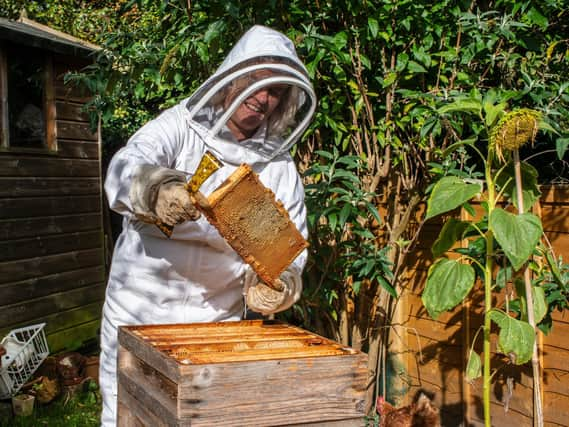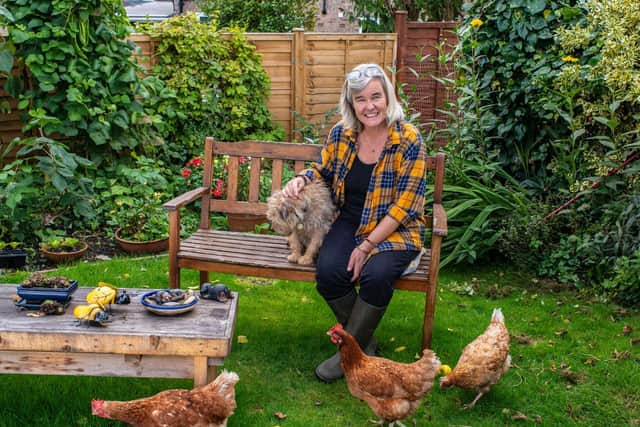Meet the environmentalist English teacher and beekeeper who has been helping asylum seekers in Leeds


“It gave me a good first hand experience of Africa and I learnt a lot. I think a lot of the lessons I learnt then are still with me now...I learnt about the culture and it feels like nowadays in this country and in ‘developed’ countries, we’ve got quite far away from a lot of the stuff that’s very important. There, family is very close, they look after their elderly people, they grow their own food. It was all very basic and simple - and our lives here are far more complicated.”
It was an experience that continues to shape the 59-year-old’s approach to life today; not only did it set her off on her continuing career teaching English to speakers of other languages (ESOL), but the ‘back to basics’ and ‘grow your own’ mentality of the people she met has remained with her in her love of animals and the environment and her drive to live more sustainably.
Advertisement
Hide AdAdvertisement
Hide AdIn the past few months, during the coronavirus pandemic, she has taken on three ‘rescue’ chickens that were destined for slaughter after a period as commercial laying hens and has also developed a vegetable patch.


“You can see the chickens if you want?”, she asks as we speak via video call, Anne from her home in Knaresborough. She pans the camera to her garden where the trio are mooching, two in a coop and one escapee who has made it to the other side of the fence.
After reaching to collect a freshly-laid egg, she flips the screen to focus on her veg. “I’ve got a compost heap too,” she says. “I went to Cornwall in the summer and I got back from holiday and normally I’d then need to go shopping. I use a milkman now because I’m trying to stop using the plastic milk cartons so I had milk, eggs from the chickens and I had spinach, beetroot and courgettes from the garden and so I didn’t need anything.”
Part of a group of women beekeepers in the town, Anne also has two hives, based in Staveley, North Yorkshire, each one with around 50,000 bees. Five years ago, she attended a beekeeping workshop at Harewood House in Leeds - and the rest is history.
Advertisement
Hide AdAdvertisement
Hide Ad“Beekeeping is all linked with saving the planet. Bees are important,” she says. As champion pollinators, the insects help maintain the diversity of habitats and support crops that are used to feed both humans and animals.
”[Beekeeping] is a challenge because bees are very complicated but I really like trying to understand how other creatures work and survive. Bees have a very complex social structure in a beehive. Just watching them is fascinating.”
Anne has harvested honey twice this year and has sold it to friends and family. In doing so, she has raised funds for local groups, donating £450 between the Knaresborough cook and eat programme, which sees members of the community cook together using food that would otherwise have gone to landfill, and Resurrected Bites.
The latter typically intercepts ingredients destined for waste and uses them to serve meals in pay as you feel cafes, but during the pandemic has been providing food parcels for those in need.
Advertisement
Hide AdAdvertisement
Hide AdAnne found out about their work through environmental Facebook group SPARKs (Saving the Planet by Awareness and Recycling Knaresborough) of which she was a founding member in January 2018. It is with the help of this group that she has also been supporting asylum seekers at a hotel in Leeds.
Through the social media of Care4Calais, a volunteer-run charity working with refugees in France and Belgium whose work Anne supports and follows, she learnt in May of reports that some people being temporarily housed in a Leeds hotel during the pandemic were in need of clothing and footwear. She says with no cash allowance from the Government, they were unable to purchase such items themselves.
In a fact sheet published in July, the Home Office said asylum seekers had continued to receive accommodation and support during the pandemic whilst their asylum claims were being assessed and in some instances this involved temporarily housing them in hotels.
“If they are accommodated in full board then all accommodation, utilities, meals and essentials are provided by the accommodation provider and a cash allowance is not paid,” it said.
Advertisement
Hide AdAdvertisement
Hide Ad“The new arrivals have got nothing,” Anne says. “They’ve got the clothes they’re standing up in, they often haven’t got shoes, their phones are often damaged or smashed and they’re therefore struggling to communicate with their families back home.
“I knew I quickly needed to get lots of clothes, shoes and phones so put a post in the SPARKs Facebook group. I knew everyone had been doing their lockdown clear outs so I thought it was a good way to pass things on to a good cause. Quite quickly my garage filled up with bags. Some people bought new things for me to take for them...It meant that an awful lot of people benefitted very quickly.”
Anne has taken several car loads of items over since May, also providing those staying at the hotel with some of her former resources to help them with learning English.
Her first foray into teaching the language to non-native speakers was at a secondary school in France, during a year abroad as part of her French degree at the University of East Anglia.
Advertisement
Hide AdAdvertisement
Hide AdBy the time she finished studying, she had already travelled to several places in Europe and spent time as a nanny in Canada but was keen to experience what life was like in a ‘developing’ country and so applied to teach English in Kenya with international development organisation VSO (Voluntary Service Overseas).
When she returned, she did her Postgraduate Certificate in Education at the University of Manchester and took a diploma in teaching English overseas. Since 1998, after some time away from work when her two children were young, she has been in her current role teaching ESOL to college students in Yorkshire.
Nour Aldeen is one of the people who was supported by Anne whilst temporarily housed at the hotel in Leeds. He’s from Damascus in Syria and first arrived in the UK in July, staying in the accommodation for several weeks before being moved to a shared house in Newcastle.
“The hotel I was in was really good, there was accommodation and food but there was no kind of [financial] support,” he says. “If I wanted to visit my family (two of his uncles live in Leeds having moved to the UK under a resettlement programme four years ago), I couldn’t, I had to wait for them to visit me because I couldn’t afford the transportation.”
Advertisement
Hide AdAdvertisement
Hide AdBack in Syria, 26-year-old Nour studied politics and public relations and also volunteered as a paramedic with the Red Cross and worked as a driver, having previously being employed as a sales manager in a food company.
“The law in my country says when I finish university, I should join the army. It’s mandatory for every guy with any brothers in his family...To do military service is essentially to kill or be killed," he says. "If I joined the army or any other part of the conflict in Syria, I would have been joining a killing machine.”
Nour says he had no choice but to leave. Now volunteering with Care4Calais as an interpreter and applying for university study here whilst waiting for a decision on his asylum claim, he informally taught English to fellow residents in his hotel in Leeds. He says Anne supported him with preparing lessons and resources and also helped to source him an e-reader so he could read books digitally.
“I felt it was my responsibility to help others [by teaching them English] because I was lucky enough to know something they don’t,” he says.
Advertisement
Hide AdAdvertisement
Hide AdAs for Anne, her time in Kenya has helped equip her in her teaching, providing her with an empathetic perspective that has also served her well in supporting asylum seekers.
“The people there were very welcoming and generous. What they have they share, and they all wanted to help me and teach me their language," she reflects.
"But I can remember one day thinking that when I go home I need to remember that I felt really lonely sometimes. I’m very aware of what it feels like to be in a completely different culture...Sometimes it’s awful, you feel really cut off, you don’t understand where people are coming from and you don’t understand an awful lot of the country’s cultural norms or the language. I feel quite well equipped I suppose to help people now.”
To offer support to asylum seekers staying in hotels, email [email protected] and to find out more or donate to the organisation, visit care4calais.org